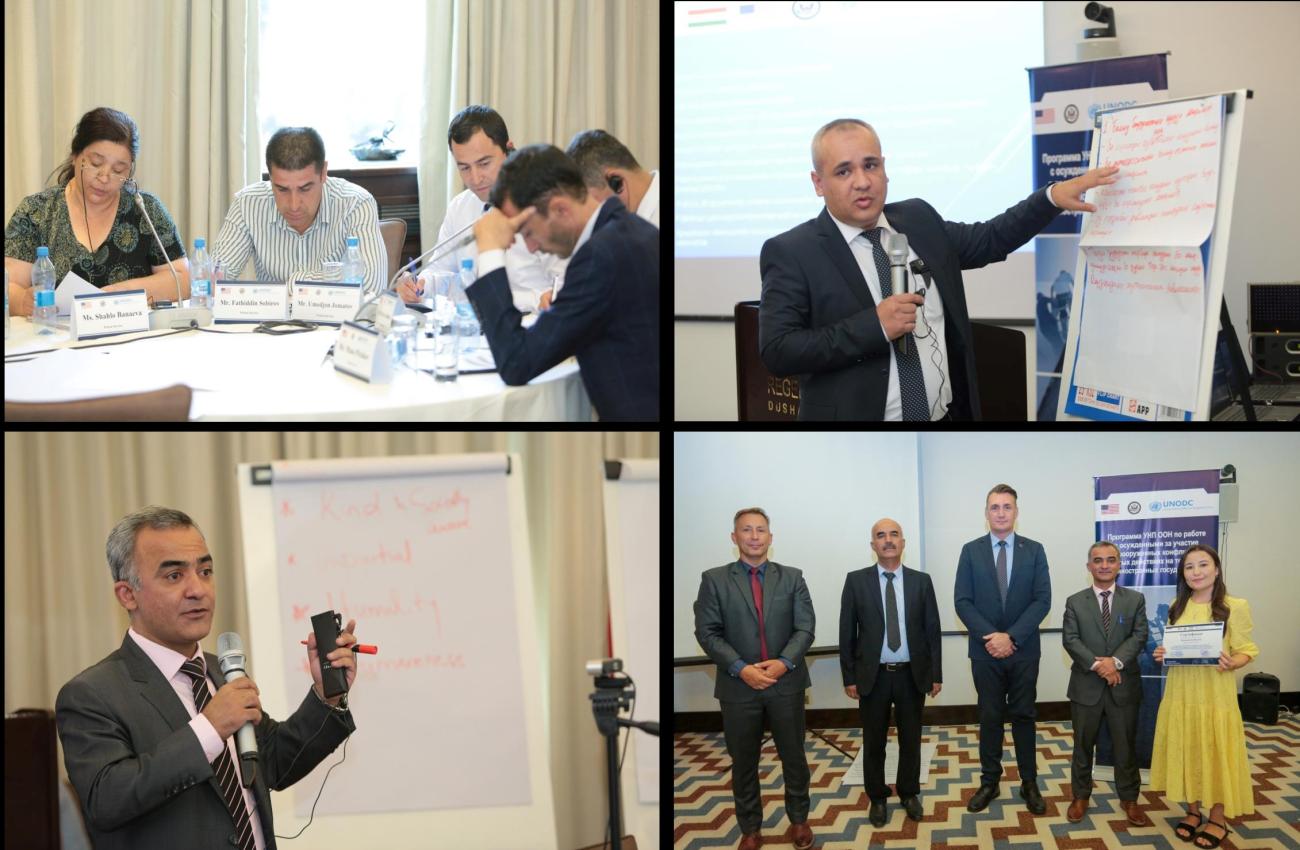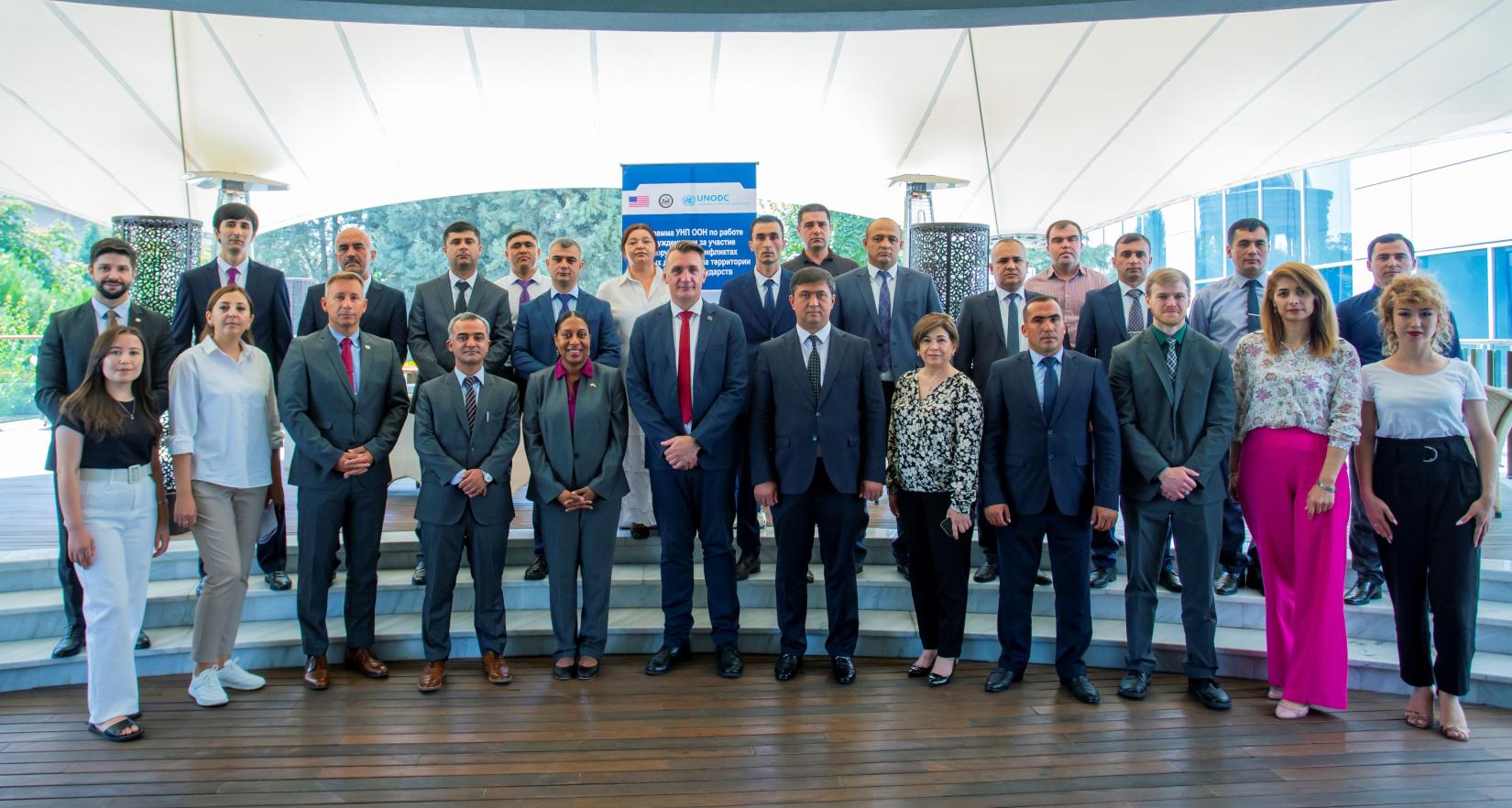UNODC trains prison officers in Tajikistan

The mission of UNODC is to contribute to the achievement of security and justice for all by making the world safer from crime, drugs, and terrorism.
One of the important objectives of the staff of prison services is to contribute to public safety through safe, secure and humane management of suspects and offenders and the provision of opportunities for rehabilitation and reintegration. Prison staff training is essential to enable them to mitigate potential threats in prison and find solutions on how to manage prison challenges at large.
The UNODC’s approach to supporting the penitentiary system is underpinned by international norms and standards, including the Universal Declaration of Human Rights (1948) and the Standard Minimum Rules for the Treatment of Prisoners (The Nelson Mandela Rules).
On 18 – 20 July 2022, UNODC conducted in Dushanbe (Tajikistan) a three-day workshop on training curricula for prison officers and the Nelson Mandela Rules. The workshop aimed to review the current training curriculum for prison officers and elaborate on the institutionalization of the UNODC’s e-learning course on the Nelson Mandela Rules into the regular training curriculum for prison officers. Twenty penitentiary system officers attended the workshop.
“Capacity building is particularly important for prison staff working with prisoners convicted for extremism and terrorism. Improving the skills of our staff to organize work with these groups of prisoners more effectively is our priority. We are confident that today’s workshop allowing for an exchange of views on various challenges of the penitentiary system, will be useful for the participants, and will also provide the opportunity to develop recommendations for further cooperation and exchange of best practices,” said Mr. Furkat Akbarov, Deputy Head of the Main Directorate for the Execution of Criminal Sentences under the Ministry of Justice of the Republic of Tajikistan in opening the workshop.
“The work and focus dedicated to identifying and improving the curriculum by the UNODC team, in conjunction with the Ministry of Justice in Tajikistan, will deliver high-quality results and improve the ability of prison officers in Tajikistan to effectively and successfully work with foreign terrorist fighters and violent extremist prisoners,” said Ms. Bridgette Walker, Chargé d’Affaires, the U.S. Embassy in Dushanbe in her welcome remarks.
“Beginning this workshop today, on Nelson Mandela Day, is no mere coincidence. The Nelson Mandela Rules - are a guiding light for the establishment of safe and humane prisons around the globe that properly rehabilitate and prevent individuals from reoffending. These rules provide a strong, principled foundation on which prison systems can best address the needs of the prisoners and the country’s security,” she added.
The workshop was conducted in a hybrid format and provided theoretical and practical sessions. The sessions were delivered by Torben Adams, Shah Salman Khan, Jörg Lorenz, Batyr Saparbaev, and Myrzabek Tuiganov - international experts with extensive experience in criminal justice, human rights and security, prison system management, training prison staff and curriculum design.
Mr. Torben Adams, UNODC International Programme Coordinator, thanked the Government of Tajikistan for its commitment to the joint Returning Foreign Terrorist Fighters Detention Programme in the country and all related initiatives. He also expressed gratitude to the U.S. Government for the financial support that enabled to work in partnership on the important topics of security and safety in prison, and on rehabilitation and reintegration of prisoners.
“In our joint mission to ‘leave no-one behind’, we must not forget prisoners and those who are tasked with their custody and care. On Nelson Mandela Day, we are sending a strong message to that effect – a message which reiterates the need to ensure continued human rights compliance behind bars and which reiterates that treating prisoners in line with their human dignity and effectively preparing them for their release is an essential contributor to public safety and the cohesion of societies,” he noted.
During the workshop, the participants learned about the Nelson Mandela Rules, national and international training curricula for prison staff, core competencies required for prison staff working with violent extremist prisoners and foreign terrorist fighters, special needs of women violent extremist prisoners and juveniles recruited and exploited by violent extremist groups. They also acquired knowledge and skills in the process of curriculum design and the related management techniques in some jurisdictions with an emphasis on the DACUM (Developing a Curriculum) method.
They had a dedicated discussion on the selection and recruitment process for staff working in prison, and on the induction and advanced training which should be offered for staff working in prison.
On the last day of the workshop, the participants made recommendations on the design, delivery and institutionalization of an in-service training curriculum for prison officers dedicated to the management of high-risk prisoners, including terrorist and foreign terrorist fighters prisoners, and put forward suggestions on the institutionalization of the UNODC’s e-learning course on the Nelson Mandela Rules into the regular training curriculum for prison staff in Tajikistan.
Upon completion of the workshop, the participants were awarded certificates. They thanked UNODC and trainers for the high quality of the workshop.
The workshop was conducted under the UNODC Global Returning Foreign Terrorist Fighters Detention Programme and the UNODC Programme for Central Asia 2022-2025. The UNODC Global Returning Foreign Terrorist Fighters Detention Programme is funded by the Counterterrorism Bureau of the U.S. Department of State.
The programme in Tajikistan aims to enhance the national capacity to manage threats posed by foreign terrorist fighters through technical assistance to law enforcement, corrections, and justice sector agencies consistent with relevant norms of international law.


